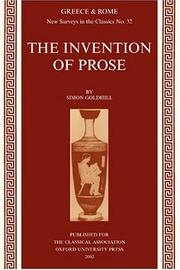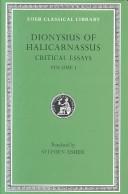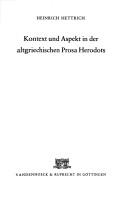| Listing 1 - 10 of 22 | << page >> |
Sort by
|

ISBN: 0198525230 9780198525233 Year: 2002 Volume: 32 Publisher: Oxford : Oxford university press,
Abstract | Keywords | Export | Availability | Bookmark
 Loading...
Loading...Choose an application
- Reference Manager
- EndNote
- RefWorks (Direct export to RefWorks)
Book
Year: 1909 Publisher: Oxonii: E typographeo Clarendoniano,
Abstract | Keywords | Export | Availability | Bookmark
 Loading...
Loading...Choose an application
- Reference Manager
- EndNote
- RefWorks (Direct export to RefWorks)
Greek language --- Greek prose literature --- Latin language --- Latin prose literature
Book
ISBN: 0674200411 9780674200418 Year: 1993 Publisher: Cambridge (Mass.): Harvard university press,
Abstract | Keywords | Export | Availability | Bookmark
 Loading...
Loading...Choose an application
- Reference Manager
- EndNote
- RefWorks (Direct export to RefWorks)
Book

ISBN: 0674996364 9780674996366 Year: 2009 Volume: 508 Publisher: Cambridge: Harvard university press,
Abstract | Keywords | Export | Availability | Bookmark
 Loading...
Loading...Choose an application
- Reference Manager
- EndNote
- RefWorks (Direct export to RefWorks)
Works by authors such as Philitas of Cos, Alexander of Aetolia, Hermesianax of Colophon, Euphorion of Chalcis and, especially Parthenius of Nicaea, who composed the mythograpical Sufferings in Love, represent rich inventiveness in Hellenistic prose and poetry from the fourth to the first century BCE.
Greek poetry, Hellenistic --- Greek prose literature --- Greek prose literature, Hellenistic --- Languages & Literatures --- Greek & Latin Languages & Literatures --- Hellenistic Greek poetry --- Hellenistic Greek prose literature --- Greek literature, Hellenistic --- Greek literature --- Geschichte 336 v. Chr.-31 v. Chr. --- Greek prose literature, Hellenistic - Translations into English --- Greek poetry, Hellenistic - Translations into English --- Greek prose literature - Translations into English --- Poésie grecque hellénistique --- Prose grecque --- Translations into English --- Traductions anglaises --- Greek poetry, Hellenistic. --- Greek prose literature, Hellenistic.

ISBN: 0674995139 0434994669 0674995120 0434994650 9780434994663 9780434994656 9780674995130 9780674995123 Year: 1985 Volume: 465 Publisher: Cambridge (Mass.) : London : Harvard U.P. ; Heinemann,
Abstract | Keywords | Export | Availability | Bookmark
 Loading...
Loading...Choose an application
- Reference Manager
- EndNote
- RefWorks (Direct export to RefWorks)
DIONYSIUS OF HALICARNASSUS migrated to Rome in 300 B.C., where he lived until his death some time after 8 B.C., writing his Roman Antiquities in twenty books and teaching the art of rhetoric and literary composition to a small group of upper-class Romans. His purpose, both in his own work and in his teaching, was to re-establish the classical Attic standards of purity, invention and taste in order to reassert the primacy of Greek as the literary language of the Mediterranean world. The essays in the present volume display the full range of Dionysius' critical expertise. In the treatise On Literary Composition, his finest and most original work, discussion of the effects produced by the arrangement of words involves minute analysis of phonetics and metre in addition to more general aspects of literary aesthetics such as the difference between poetry and prose, and the tripartite classification of the types of arrangement. The other four essays are on a less ambitious scale. The Dinarchus is primarily a study of authenticity in which Dionysius attempts to identify the genuine speeches of the latest Attic orator from the list of those ascribed to him by the librarians. The three literary letters are all concerned with possible models. In the Letter to Pompeius, Dionysius gives his reasons for criticizing Plato on stylistic and also moral grounds, and appends critiques of Herodotus, whom he greatly admired, and three other historians -- Xenophon, Philistus and Theopompus. Of the two Letters to Ammaeus, the second may be read as an appendix to the Thucydides, but the first concerns literary history, and investigates the question of whether Demosthenes could have learnt his oratorical skills from Aristotle's Rhetoric. Volume I contains the essays On the Ancient Orators, Lysias, Isocrates, Isaeus, Demosthenes, and Thucydides.
Classical Greek literature --- Literary rhetorics --- Dionysios d'halicarnasse --- Discours, essais, conferences --- Edition critique --- Greek prose literature.
Book
ISBN: 3515066764 9783515066761 Year: 1995 Volume: 52 Publisher: Stuttgart: Steiner,
Abstract | Keywords | Export | Availability | Bookmark
 Loading...
Loading...Choose an application
- Reference Manager
- EndNote
- RefWorks (Direct export to RefWorks)
Greek prose literature --- Greek language --- History and criticism. --- Style. --- -Greek prose literature --- -Greek literature --- Classical languages --- Indo-European languages --- Classical philology --- Greek philology --- Style --- History and criticism --- Pherecydes of Athens --- -Literary style --- -Style --- Pherecydes, --- Pherekydēs, --- Pherekydes, --- Literary style. --- Athens (Greece) --- Intellectual life. --- Greek prose literature - History and criticism. --- Greek language - Style.

ISBN: 3525262132 9783525262139 Year: 1976 Volume: 25 Publisher: Göttingen: Vandenhoeck und Ruprecht,
Abstract | Keywords | Export | Availability | Bookmark
 Loading...
Loading...Choose an application
- Reference Manager
- EndNote
- RefWorks (Direct export to RefWorks)
Greek prose literature --- Greek language --- History and criticism --- Aspect --- Herodotus --- Language --- -Greek prose literature --- -Greek literature --- Classical languages --- Indo-European languages --- Classical philology --- Greek philology --- -Herodot --- Gerodot --- Hērodotos --- Erodoto --- Hérodote --- Heródoto --- הירודוטוס --- הרודוט --- הרודוטוס --- هردوت --- هيرودوت --- Ἡρόδοτος --- Aspect. --- History and criticism. --- -Aspect --- -Language --- Hérodote --- Herodotos --- Herodot --- Language. --- Herodotus van Halicarnassus --- Greek prose literature - History and criticism --- Greek language - Aspect --- Herodotus - Language
Book
Year: 1971 Publisher: Stuttgart: Teubner,
Abstract | Keywords | Export | Availability | Bookmark
 Loading...
Loading...Choose an application
- Reference Manager
- EndNote
- RefWorks (Direct export to RefWorks)
Greek prose literature --- Latin prose literature --- Latin literature, Medieval and modern --- Rhyme --- Greek language --- Latin language --- Littérature grecque --- Littérature latine --- Latin (Langue) --- Grec (Langue) --- Rimes
Book
Year: 1918 Publisher: Leipzig: Teubner,
Abstract | Keywords | Export | Availability | Bookmark
 Loading...
Loading...Choose an application
- Reference Manager
- EndNote
- RefWorks (Direct export to RefWorks)
Greek prose literature --- Latin prose literature --- Latin literature, Medieval and modern --- Rhyme --- Greek language --- Latin language --- Littérature grecque --- Littérature latine --- Latin (Langue) --- Grec (Langue) --- Rimes
Book
Year: 1898 Publisher: Leipzig: Teubner,
Abstract | Keywords | Export | Availability | Bookmark
 Loading...
Loading...Choose an application
- Reference Manager
- EndNote
- RefWorks (Direct export to RefWorks)
Greek prose literature --- Latin prose literature --- Latin literature, Medieval and modern --- Rhyme --- Greek language --- Latin language --- Littérature grecque --- Littérature latine --- Latin (Langue) --- Grec (Langue) --- Rimes
| Listing 1 - 10 of 22 | << page >> |
Sort by
|

 Search
Search Feedback
Feedback About UniCat
About UniCat  Help
Help News
News